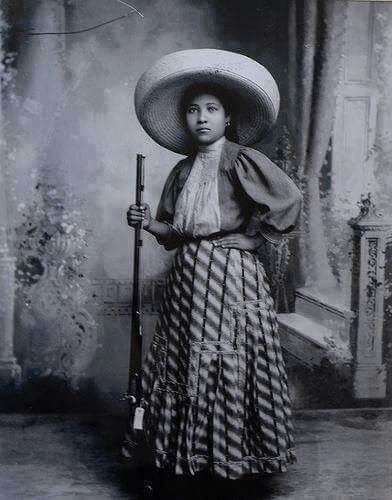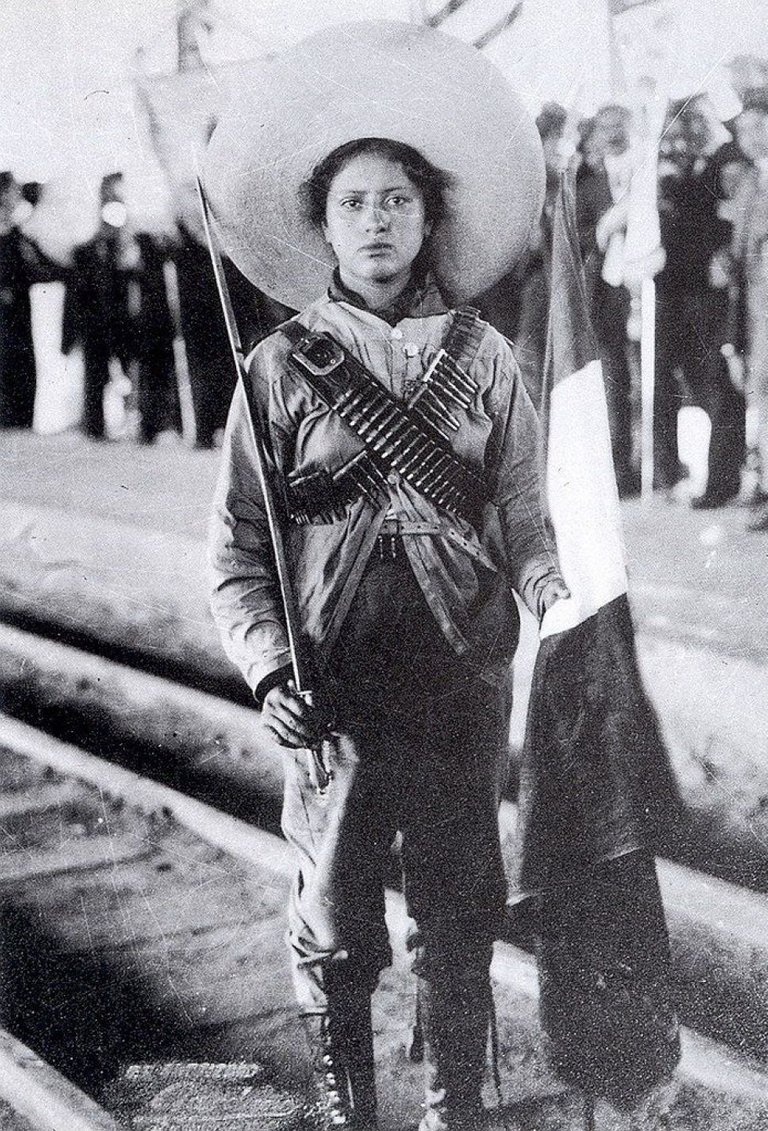La Adelita, corrido mexicano / La Adelita, Mexican corrido (Canción - Song)

La Adelita

Adela Velarde Pérez, quien solo tenía 13 años cuando se escapó de su casa para unirse a uno de los pelotones como asistente médica para ayudar a los heridos, fue la mujer que inspiró a las cientos de mujeres enfermeras que prestaron sus servicios durante la Revolución Mexicana (1910 - 1920), pero no solo cuidando de los heridos sino preparando los alimentos, cargando armas, y de ser necesario también iban a la batalla.
https://blogs.elespectador.com/cultura/ella-es-la-historia/adela-velarde-perez-1900-1971
Adela Velarde Pérez, who was only 13 years old when she ran away from home to join one of the platoons as a medical assistant to help the wounded, was the woman who inspired the hundreds of women nurses who served during the Mexican Revolution (1910 - 1920), but not only caring for the wounded but also preparing food, carrying weapons, and if necessary going into battle.
Muchas mujeres destacaron dentro de la Revolución siendo reconocidas por sus labores dentro de la lucha, también eran ascendidas de rango al igual que los hombres, es por ello que hubo varias capitanas y coronelas.
Muchas de ellas decidieron unirse a la lucha porque sus familiares, ya sean esposos, hermanos o padres, eran soldados u oficiales. Cuando sus familiares morían, ellas tomaban sus cargos, como la coronela Rosa Badillo que era esposa de Pedro Casas y tomó su cargo cuando éste murió.
También hubo algunas mujeres criminales que se unieron a la lucha, María de la Luz Espinoza Barrera había matado a la amante de su esposo cinco años antes de unirse al movimiento revolucionario, Margarita Neri era fugitiva por haber matado a su esposo y se unió a los Zapatistas. La mayoría de las mujeres soldado eran de una clase más alta que las soldaderas. La Güera Carrasco tenía una gran fortuna e incluso financió al ejército Carrasco. Carmen Vélez, luchó con un ejército compuesto de los peones de su hacienda. Chiquita, una mujer soldado del Ejército Federal que estudió en Estados Unidos y Francia fue reconocida por su papel de espionaje y realizó operaciones impresionantes, haciéndose pasar por enferma logró robar importantes documentos. Carmen Vélez destacó por estar al mando de más de trescientos hombres en Hidalgo y Cuauhtémoc. Ángela Gómez Saldaña fue agente confidencial de Zapata, llevaba y traía información a los jefes Zapatistas sobre las acciones federales y conseguía armas. Petra Herrera junto con otras cuatrocientas mujeres tomó parte de la segunda batalla de Torreón y formó su propia brigada de 25,000 mujeres.
La gran diferencia entre las soldaderas y las mujeres soldado es que las soldaderas raramente tomaban las armas, mientras que las mujeres soldado tomaban las armas y luchaban en el frente.
Many women stood out in the Revolution being recognized for their work in the struggle, they were also promoted in rank as well as men, that is why there were several captains and colonels.
Many of them decided to join the struggle because their relatives, whether husbands, brothers or fathers, were soldiers or officers. When their relatives died, they took their positions, like Colonel Rosa Badillo who was the wife of Pedro Casas and took her position when he died.
There were also some who were criminals. María de la Luz Espinoza Barrera had killed her husband's mistress five years before joining the revolutionary movement, Margarita Neri was a fugitive for having killed her husband and joined the Zapatistas. Most of the women soldiers were of a higher class than the soldaderas. La Güera Carrasco had a large fortune and even financed the Carrasco army. Carmen Vélez, fought with an army composed of her hacienda's peons. Chiquita, a female soldier of the Federal Army who studied in the United States and France was recognized for her espionage role and carried out impressive operations, posing as a sick person she managed to steal important documents. Carmen Vélez stood out for being in command of more than three hundred men in Hidalgo and Cuauhtémoc. Ángela Gómez Saldaña was Zapata's confidential agent, bringing information to and from the Zapatista chiefs about federal actions and obtaining weapons. Petra Herrera along with four hundred other women took part in the second battle of Torreón and formed her own brigade of 25,000 women.
The big difference between the soldaderas and the women soldiers is that the soldaderas rarely took up arms, while the women soldiers took up arms and fought at the front.

Adela también inspiró al soldado Antonio del Río Armenta (a quien ella atendió mientras estaba herido), y éste le compuso el famoso corrido La Adelita. Al menos es una de las versiones que se conoce de su historia, porque por otro lado hay quienes afirman que el corrido fue compuesto por Guadalupe Barajas Romero, de quienes sus familiares aseguran tener la letra original firmada por su autor.
De acuerdo a la primera versión, el soldado Antonio escribiría en agradecimiento a su Adela, quien lo atendió y de quien también se enamoró: “Si Adelita se fuera con otro, la seguiría por tierra y por mar, si es por mar en un buque de guerra, si es por tierra en un tren militar”.
Las Adelitas eran todas esas mujeres que se fueron al frente a participar en la lucha revolucionaria.
Quizás no haya la certeza de quién fue el autor de tan conocido corrido, pero lo que sí sabemos es que La Adelita se ha convertido en uno de los corridos más representativos de la Revolución Mexicana.
Se conocen diversos versos que quizás se fueron agregando durante la Revolución, pero los 3 versos originales siempre están presentes en el corrido.
Adela also inspired the soldier Antonio del Río Armenta (whom she attended to while he was wounded), and he composed the famous corrido La Adelita. At least this is one of the known versions of her story, because on the other hand there are those who affirm that the corrido was composed by Guadalupe Barajas Romero, whose relatives claim to have the original lyrics signed by its author.
According to the first version, the soldier Antonio would write in gratitude to his Adela, who took care of him and with whom he also fell in love: "Si Adelita se fuera con otro, la seguiría por tierra y por mar, si es por mar en un buque de guerra, si es por tierra en un tren militar" (If Adelita were to go with another, I would follow her by land and by sea, if by sea in a warship, if by land in a military train).
The Adelitas were all those women who went to the front to participate in the revolutionary struggle.
Perhaps there is no certainty as to who was the author of this well-known corrido, but what we do know is that La Adelita has become one of the most representative corridos of the Mexican Revolution.
There are several verses that may have been added during the Revolution, but the original 3 verses are always present in the corrido.
Después de la Revolución a Adela Velarde nunca se le reconoció su importante trabajo como enfermera ni como soldadera, ni todo lo que logró en el campo de batalla, por el contrario, quedó en el olvido. Recién en el 1962 se le reconoció como una veterana de la Revolución y por su oposición al gobierno de Victoriano Huerta. Se dice que falleció en Texas, EEUU, en la miseria.
After the Revolution, Adela Velarde was never recognized for her important work as a nurse or as a soldier, nor for all that she accomplished on the battlefield; on the contrary, she was forgotten. Only in 1962 was she recognized as a veteran of the Revolution and for her opposition to the government of Victoriano Huerta. It is said that she died in Texas, USA, in misery.
Ahora les dejo ésta grabación de La Adelita que realicé el año 2010 y que está incluido en mi CD "Orquesta Sinfónica De La Ópera Y Angelo Pagliuca presentan a Hely Orsini", disco de música latinoamericana arreglado y producido por mi hijo, el productor musical Chapis Lasca.
Now I leave you this recording of La Adelita that I made in 2010 and that is included in my CD "Orquesta Sinfónica De La Ópera Y Angelo Pagliuca presentan a Hely Orsini", an album of Latin American music, arranged and produced by my son, music producer Chapis Lasca.

https://chapislascacom.wordpress.com/producciones/
La Adelita
En lo alto de una abrupta serranía
Acampando se encontraba un regimiento
Y una joven que valiente lo seguía
Locamente enamorada del sargento.
Popular entre la tropa era Adelita,
La mujer que el sargento idolatraba
Que además de ser valiente era bonita
Y hasta el mismo coronel la respetaba.
Y se oía que decía
Aquel que tanto la quería.
Si Adelita quisiera ser mi novia,
Y si Adelita fuera mi mujer,
Le compraría un vestido de seda
Para llevarla a bailar al cuartel.
Una noche que la escolta regresaba
Conduciendo entre sus filas al sargento
Por la voz de una mujer que sollozaba
Su plegaria se escuchó en el campamento
Y al oírla el sargento temeroso
De perder para siempre a su adorada
Escondiendo su emoción bajo el embozo
A su amada le cantó de esta manera
Y si acaso yo muero en campaña
Y mi cadáver lo van a sepultar,
Adelita, por Dios te lo ruego,
Que con tus ojos me vayas a llorar.
Y después que terminó la cruel batalla
Y la tropa regresó a su campamento
por las bajas que causara la metralla
muy diezmado regresaba el regimiento
Recordando aquél sargento sus quereres
Los soldados que volvían de la guerra
Ofreciéndole su amor a las mujeres
entonaban este himno de la guerra
Si Adelita se fuera con otro
La seguiría por tierra y por mar,
Si por mar en un buque de guerra
Si por tierra en un tren militar.
La Adelita
On the top of a steep mountain range
A regiment was encamped in camp
And a young girl who bravely followed
Madly in love with the sergeant.
Popular among the troops was Adelita,
The woman whom the sergeant idolized
Who besides being brave was pretty
And even the colonel himself respected her.
And it was heard that he said
He who loved her so much.
If Adelita wanted to be my girlfriend,
And if Adelita were my wife,
I would buy her a silk dress
To take her to dance in the barracks.
One night when the escort was returning
Leading the sergeant through the ranks
At the voice of a sobbing woman
Her prayer was heard in the camp.
And hearing it the sergeant feared
Of losing forever his adored one
Hiding his emotion under his breastplate
To his beloved he sang this way.
And if I should die in the field
And my corpse will be buried,
Adelita, by God I beg you,
That with your eyes you go to mourn me.
And after the cruel battle was over
And the troops returned to their camp
because of the casualties caused by the shrapnel
The regiment returned very decimated.
Remembering that sergeant's desires
The soldiers returning from the war
Offering their love to the women
They sang this hymn of war.
If Adelita were to leave with another
I would follow her by land and by sea,
If by sea on a warship
If by land in a military train.
Do you want to get involved? Do you want to support music and this project? Follow us to keep you updated and read our Introduction post!